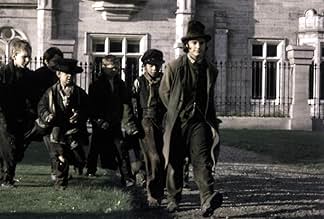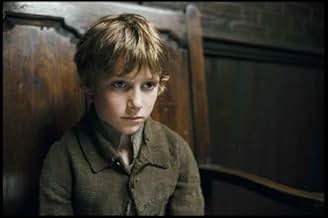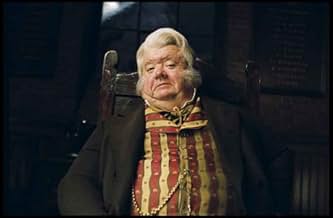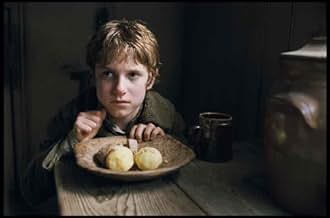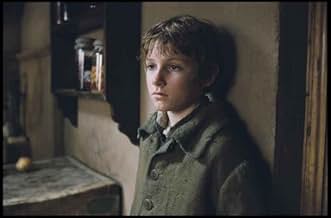An adaptation of the classic Dickens tale, where an orphan meets a pickpocket on the streets of London. From there, he joins a household of boys who are trained to steal for their master.An adaptation of the classic Dickens tale, where an orphan meets a pickpocket on the streets of London. From there, he joins a household of boys who are trained to steal for their master.An adaptation of the classic Dickens tale, where an orphan meets a pickpocket on the streets of London. From there, he joins a household of boys who are trained to steal for their master.
- Awards
- 2 wins & 4 nominations total
Joe Tremain
- Hungry Boy
- (as Joseph Tremain)
- Director
- Writers
- All cast & crew
- Production, box office & more at IMDbPro
Storyline
Did you know
- TriviaThe set was so huge that director Roman Polanski rode around it on a motorized scooter.
- GoofsFlipped shot: At 46:55, after Oliver is punched in the face while running from the crowd, the lettering on a hand held sign ('ELECTION') is backwards.
- Quotes
Oliver Twist: Please, sir, I want some more.
- Alternate versionsSPOILER: Footage of the beating of Nancy from Bill was cut in the UK to obtain a "PG" rating.
- ConnectionsFeatured in Troldspejlet: Episode #35.9 (2006)
Featured review
Adapted from the classic Dickens tale, Oliver Twist is the story of an idealistic orphan struggling to survive in a savage adult world. A world where hypocrisy, greed and cunning are celebrated and there are only rare glimpses of compassion.
The film focuses on the key events of the Dickens novel, excluding many of the subplots and associated characters. It opens with Oliver's (Barney Clark) arrival at the workhouse of "Please Sir, can I have some more" fame and follows his escape to London and its dingy underworld. Here he falls in with a band of pickpockets led by Fagin (Ben Kingsley) - a central character typifying hypocrisy, greed and cunning - but finds salvation in the form of Mr Brownlow (Edward Hardwicke) who recognizes the goodness in Oliver and endeavors to extract him from his, albeit unsuccessful, life of thievery.
As he did with his award-winning, "The Pianist", Polanksi drew on his own life experiences as an orphan in the ghettos in World War II to recreate certain moods. Grim, grimy and often claustrophobic, "Oliver Twist" startlingly depicts a callous world where children live at the whim of ruthless, self-serving adults. But the horror of this dark, unforgiving world is relieved by the inclusion of humour and banter throughout, making the film both captivating and entertaining.
As Oliver, Barney Clark exemplifies the helplessness of an innocent at the mercy of strangers and being manipulated for their benefit. As noted by Mr Sowerberry, the undertaker, "There's an expression of melancholy in his face, my dear, which is very interesting. He'd make a delightful mute". And mute and incapacitated - be it through hunger, illness, injury and/or fear - he is for much of the film. Other than a surprising brief show of defiance that takes him from the coal shed and sets him on the road to London, there is little evidence of any determination, strength or willfulness at all in this Oliver. But unfortunately there is little to endear him either and the film suffers for it.
Harry Eden has more depth and is much more compelling as the Artful Dodger. Plucky and likable, his struggle with the consequences of his betrayal of Nancy (Leanne Rowe) is agonising. Ben Kingsley is masterful and almost unrecognizable as Fagin. Depicted as pure evil in the novel, Polanksi strives to give this character humanity and meaning. The result is a foul, exploitative, groveling survivor a desperate and pitiful villain, but not a completely heartless one.
The elimination of many of the twists of the novel means that this film may disappoint viewers familiar with the intriguing undercurrents of Dickens' plot and richness of his characters' and their relationships. The only incredible discovery that Oliver makes in this version is that there is a better life to either the workhouse or the den of thieves.
While adaptation to film necessitates simplification of the story and as Polanksi points out "For today's taste, you need to abandon a certain amount of melodrama that was very typical for the period", it is easy to feel that in this paring down we have been left with an entertaining adventure set in 19th century Britain. When it comes to this Oliver, less is not more.
The film focuses on the key events of the Dickens novel, excluding many of the subplots and associated characters. It opens with Oliver's (Barney Clark) arrival at the workhouse of "Please Sir, can I have some more" fame and follows his escape to London and its dingy underworld. Here he falls in with a band of pickpockets led by Fagin (Ben Kingsley) - a central character typifying hypocrisy, greed and cunning - but finds salvation in the form of Mr Brownlow (Edward Hardwicke) who recognizes the goodness in Oliver and endeavors to extract him from his, albeit unsuccessful, life of thievery.
As he did with his award-winning, "The Pianist", Polanksi drew on his own life experiences as an orphan in the ghettos in World War II to recreate certain moods. Grim, grimy and often claustrophobic, "Oliver Twist" startlingly depicts a callous world where children live at the whim of ruthless, self-serving adults. But the horror of this dark, unforgiving world is relieved by the inclusion of humour and banter throughout, making the film both captivating and entertaining.
As Oliver, Barney Clark exemplifies the helplessness of an innocent at the mercy of strangers and being manipulated for their benefit. As noted by Mr Sowerberry, the undertaker, "There's an expression of melancholy in his face, my dear, which is very interesting. He'd make a delightful mute". And mute and incapacitated - be it through hunger, illness, injury and/or fear - he is for much of the film. Other than a surprising brief show of defiance that takes him from the coal shed and sets him on the road to London, there is little evidence of any determination, strength or willfulness at all in this Oliver. But unfortunately there is little to endear him either and the film suffers for it.
Harry Eden has more depth and is much more compelling as the Artful Dodger. Plucky and likable, his struggle with the consequences of his betrayal of Nancy (Leanne Rowe) is agonising. Ben Kingsley is masterful and almost unrecognizable as Fagin. Depicted as pure evil in the novel, Polanksi strives to give this character humanity and meaning. The result is a foul, exploitative, groveling survivor a desperate and pitiful villain, but not a completely heartless one.
The elimination of many of the twists of the novel means that this film may disappoint viewers familiar with the intriguing undercurrents of Dickens' plot and richness of his characters' and their relationships. The only incredible discovery that Oliver makes in this version is that there is a better life to either the workhouse or the den of thieves.
While adaptation to film necessitates simplification of the story and as Polanksi points out "For today's taste, you need to abandon a certain amount of melodrama that was very typical for the period", it is easy to feel that in this paring down we have been left with an entertaining adventure set in 19th century Britain. When it comes to this Oliver, less is not more.
- How long is Oliver Twist?Powered by Alexa
Details
- Release date
- Countries of origin
- Official site
- Language
- Also known as
- Oliver Twist: Cậu Bé Mồ Côi
- Filming locations
- Prague, Czech Republic(only studio)
- Production companies
- See more company credits at IMDbPro
Box office
- Budget
- $60,000,000 (estimated)
- Gross US & Canada
- $2,080,321
- Opening weekend US & Canada
- $68,447
- Sep 25, 2005
- Gross worldwide
- $42,580,321
- Runtime2 hours 10 minutes
- Color
- Sound mix
- Aspect ratio
- 2.35 : 1
Contribute to this page
Suggest an edit or add missing content








